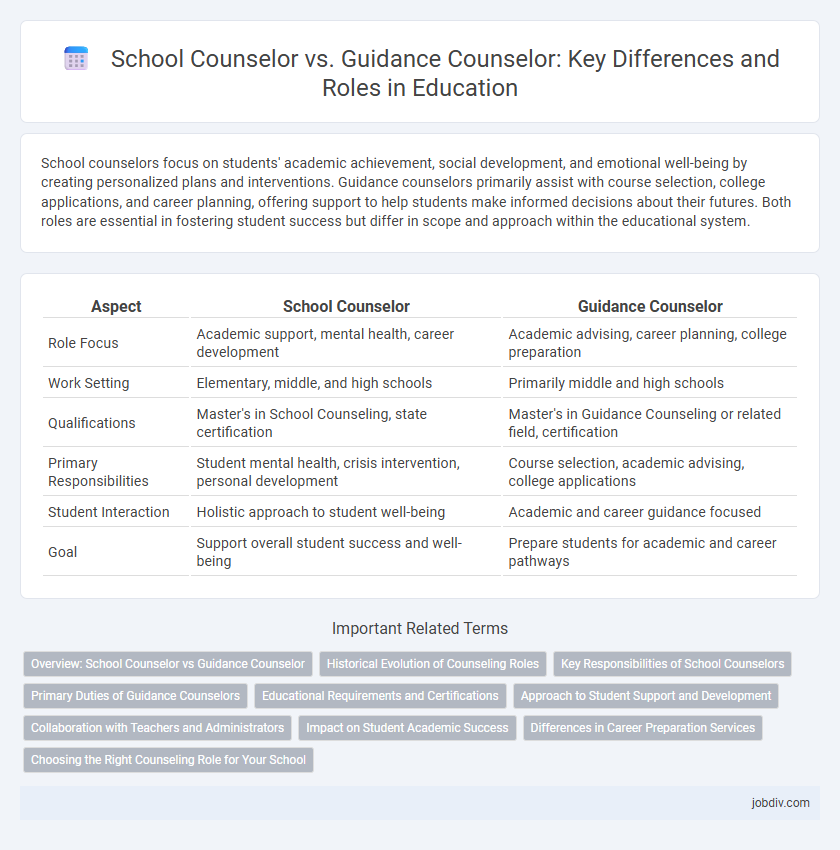School counselors focus on students' academic achievement, social development, and emotional well-being by creating personalized plans and interventions. Guidance counselors primarily assist with course selection, college applications, and career planning, offering support to help students make informed decisions about their futures. Both roles are essential in fostering student success but differ in scope and approach within the educational system.
Table of Comparison
| Aspect | School Counselor | Guidance Counselor |
|---|---|---|
| Role Focus | Academic support, mental health, career development | Academic advising, career planning, college preparation |
| Work Setting | Elementary, middle, and high schools | Primarily middle and high schools |
| Qualifications | Master's in School Counseling, state certification | Master's in Guidance Counseling or related field, certification |
| Primary Responsibilities | Student mental health, crisis intervention, personal development | Course selection, academic advising, college applications |
| Student Interaction | Holistic approach to student well-being | Academic and career guidance focused |
| Goal | Support overall student success and well-being | Prepare students for academic and career pathways |
Overview: School Counselor vs Guidance Counselor
School counselors and guidance counselors both support student development but differ in scope and focus. School counselors provide comprehensive programs addressing academic achievement, personal/social growth, and career planning, often requiring specialized training and certification. Guidance counselors typically concentrate on course selection and college admissions advising within a more limited framework.
Historical Evolution of Counseling Roles
School counselors originated in the early 20th century, initially focusing on vocational guidance to help students transition from school to work. Over time, their roles expanded to address academic achievement, personal development, and mental health support. Guidance counselors, a term often used interchangeably in some regions, historically emphasized college and career advising but have evolved to encompass broader psychosocial support within educational settings.
Key Responsibilities of School Counselors
School counselors focus on supporting students' academic achievement, social-emotional development, and career readiness through individual counseling, group sessions, and collaboration with teachers and families. They implement interventions for mental health challenges, provide crisis response, and develop comprehensive school counseling programs aligned with American School Counselor Association (ASCA) National Model standards. Their role extends to data-driven decision-making to improve student outcomes and advocate for equitable access to resources and opportunities.
Primary Duties of Guidance Counselors
Guidance counselors primarily focus on supporting students' academic development, social-emotional well-being, and career planning through individualized counseling and group sessions. They collaborate with teachers, parents, and administrators to create personalized educational plans and address behavioral or mental health issues impacting student performance. Their duties also include organizing workshops on study skills, college applications, and coping strategies to enhance overall student success.
Educational Requirements and Certifications
School counselors typically require a master's degree in school counseling or a related field, along with state certification or licensure specific to K-12 education settings. Guidance counselors generally need a bachelor's degree in psychology, education, or counseling, but advancing often requires a master's degree and relevant certification, depending on state regulations. Both roles emphasize educational credentials aligned with state-approved certification programs to ensure qualifications for supporting student academic and personal development.
Approach to Student Support and Development
School counselors focus on holistic student development by addressing academic, career, and social-emotional needs through personalized guidance and supportive interventions. Guidance counselors primarily concentrate on academic advising and course selection to ensure students meet graduation requirements and college entry criteria. Both roles emphasize student well-being, but school counselors integrate mental health strategies and community resources to foster long-term personal growth.
Collaboration with Teachers and Administrators
School counselors collaborate closely with teachers and administrators to develop comprehensive support plans addressing students' academic, social, and emotional needs. Guidance counselors often focus on academic advising and course selection, coordinating with educators to ensure students meet graduation requirements. Both roles emphasize teamwork in creating a positive school environment that fosters student well-being and success.
Impact on Student Academic Success
School counselors play a critical role in enhancing student academic success by providing personalized academic planning, social-emotional support, and college/career readiness guidance. Guidance counselors, often focused on course scheduling and disciplinary oversight, contribute to student achievement by ensuring appropriate class placements and addressing behavioral challenges. Effective collaboration between both roles maximizes student potential through comprehensive support systems tailored to individual educational needs.
Differences in Career Preparation Services
School counselors provide comprehensive career preparation services by integrating academic planning, social-emotional development, and career exploration tailored to individual student needs. Guidance counselors primarily focus on immediate academic guidance and course selection, often emphasizing short-term educational goals rather than long-term career planning. The distinction lies in the holistic approach of school counselors compared to the more limited, guidance-oriented role of traditional guidance counselors.
Choosing the Right Counseling Role for Your School
School counselors primarily support students' academic achievement, social development, and career planning, while guidance counselors often focus on addressing personal and emotional challenges. Choosing the right counseling role depends on your school's priorities, student demographics, and specific needs, such as whether the emphasis is on college readiness or mental health support. Evaluating school data and stakeholder input helps ensure the counselor's role aligns with the institution's educational goals and student wellbeing.
School Counselor vs Guidance Counselor Infographic

 jobdiv.com
jobdiv.com